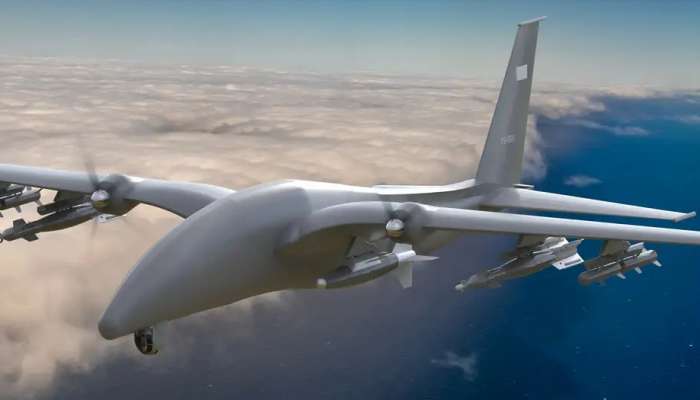
Bamako: Yet another conflict story unravels from Tin Zaouatine, a desert region in Mali's far north-east. The same region that had witnessed an unprecedented defeat of Russian mercenaries who were ambushed by Tuareg rebels in August 2024 is again at the epicentre of an unfolding crisis.
On the night between March 31 and April 1, a Turkish-manufactured Akinci surveillance drone operated by the Malian military literally fell from the sky. Video footage circulating on social media depicted burning debris falling and crashing into an uninhabited area.
Hours later, the Algerian army stated that an air defence unit in the border region shot down an armed reconnaissance drone that had entered Algerian airspace. Bamako, the capital of Mali, disagreed, arguing that the wreckage was found almost 10 kilometres (6 miles) into Malian territory.
The unprecedented incident has since created a major diplomatic rift between the neighbors. While it appears that neither side has an interest in escalating the issue, the crisis has been intensifying.
Protests, retaliation and solidarity
Shortly after Algeria took responsibility, hundreds of protesters gathered in front of the country's embassy in Bamako, according to a DW reporter. "They destroyed the drone on our territory. Enough is enough! We're here to show the world that we stand with our authorities," one of the demonstrators told DW.
Mali's military junta retaliated through diplomatic means: In a coordinated step with its close allies Niger and Burkina Faso – both also governed by juntas — all three Sahel Alliance (AES) states withdrew their ambassadors from Algeria. Algiers quickly reciprocated. A day later, both Mali and Algeria closed their airspace to each other's aircraft.
While it might have been an easy choice for Burkina Faso to stand in solidarity with its ally, the decision might have been more difficult for Niger.
"From a Nigerien perspective, this is not a good development, because they have just improved their ties with Algeria," said Ulf Laessing, head of the Sahel program of the German Konrad Adenauer Foundation (KAS), which is affiliated with the German conservative party CDU.
"Algeria had made an effort for Niger, especially because the relations with Mali are this bad. Algeria's state oil company Sonatrach has signed a contract in Niger, from which Niger profits economically," Laessing told DW.
Malian Foreign Minister Abdoulaye Diop accused Algiers of supporting terrorism.
"The council of AES leaders consider the destruction of the drone operated by Malian armed forces as a hostile action against all AES members and a perfidious step that in a way promotes terrorism and destabilization of the region," Diop told DW.
Algeria denied any wrongdoing in the drone incident and accused Mali of trying to redirect blame for its internal problems.
"The junta of putschists ruling in Mali is vainly attempting to make our country a scapegoat for the setbacks and woes of which the Malian people are paying the heaviest price," Algeria's foreign ministry said in a statement.
Mali-Algerian relations have deteriorated since 2023
Mali and Algeria share a common history of French colonial oppression. Since they became independent in 1960 and 1962 respectively, relations between both countries have been through rough patches. Security on the 1,300-kilometre-long (808-mile-long) border has always been a contentious issue. In 2015, after three years of fighting between Mali's army and northern rebels, Algeria successfully mediated a peace contract — the Algiers Accords.
However, both the security in Northern Mali and relations with Algeria have remained fragile — especially after Mali's military coups in 2020 and 2021. Amid new clashes between the Algiers Accords signatories, reports of atrocities committed by Malian soldiers and their new brothers in arms, Russian Wagner mercenaries, surfaced.
According to Laessing, relations further deteriorated in late 2023, when Algerian President Abdelmadjid Tebboune hosted Mahmoud Dicko, a powerful imam from Mali's Tomboctou region, whom the military junta perceives as a threat due to his popularity.
"This was seen as a provocation in Bamako. Mali subsequently terminated the Algiers accords. Algeria retaliated verbally. This way, the crisis aggravated — and because of that, we've already been on a level of crisis," Laessing said.
Malian analyst Paul Oula told DW that the diplomatic relations between Mali and Algeria lack trust.
"Today, Malian authorities completely disapprove of the Algerian authorities' interference in the management of the security crisis in Mali," Oula said.
At the same time, Oula believes that the falling out is of greater benefit to Morocco. Rabat has increased its footprint in the Sahel region over the last years, offering the landlocked AES countries a connection to maritime trade without having to rely on ECOWAS countries.
Ways to resolve the tensions
Outside actors are worried that further hostilities between Mali and Algeria could be detrimental for the region's already fragile security. The West African economic bloc ECOWAS, where the three AES states had been members before their wave of coups, appealed in a statement to both sides to "de-escalate the tension, foster dialogue and use regional and continental mechanisms to settle differences".
Mohamed Si Bachir, political analyst and professor at the National School of Political Science (École Nationale Supérieure de Sciences Politiques) in Algiers, says there are ways to defuse the crisis.
"We could use the social and diplomatic leverages," Si Bachir told DW. "In diplomacy, Algeria maintains good capabilities and has long experience in regional conflicts. We can assume that this machine is starting up and going in search of a solution." But also the personal relations between communities on both sides of the Algerian-Malian border could help to bridge the gaps.
While neither side seems to benefit from the fallout, it remains to be seen whether Mali and Algeria will be able to summon enough political will to settle their dispute.